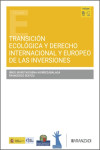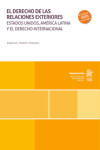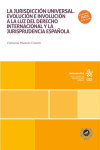40 UNDER 40 INTERNATIONAL ARBITRATION (2018)
González-Bueno, Carlos
Datos técnicos
- ISBN 9788491485872
- Año Edición 2018
- Páginas 522
- Encuadernación Tapa Dura
- Idioma Inglés
Sinopsis
The importance of this book can hardly be overstated. 40 bright and experienced practitioners, below 40 years of age, coming from all continents, almost half of them women, is an almost perfect image of the arbitration world of tomorrow. Achieving greater gender, generational and regional diversity is fundamental condition for maintaining trust in arbitration as a global system of justice and as a fair and legitimate means of resolving international business disputes with globalization and the rise of emerging markets, in particular in Asia and Africa, arbitral institutions need to reach out to a much broader population of arbitrators of diverse origins and experiences if it wants to meet the needs of the users of arbitration in the decades to come.
This book brings together forty authors who are among the most promising rising stars in international arbitration. The topics elected by the authors go to the fundamentals of arbitration, such as due process, independence and impartiality the role of good faith, and human rights. The book also addresses in a talented and often innovative way novel questions such as the role of psychology in arbitration, cognitive biases, third-party funding or the way in which technology will transform our profession in the years to come. My only wish is to see further editions of this remarkable book, and to see more authors from Africa and Asia amongst its future authors. I have no doubt that Carlos González-Bueno will heed this call. We should all be grateful to him for this remarkable initiative, which will greatly contribute to open the door to the new generation of arbitrators.
(Alexis Mourre)
Índice
Editor’s Biography
Foreword by Alexis Mourre
Editor’s note
ARBITRATORS: IS’S NOT ALL ABOUT INDEPENDENCE AND IMPARTIALITY
Unmeritorious challenges: is it time to say enough?, Chistian Albanesi
What would have happened if? The role of hypothesis, assumptions, good faith estimates and speculation in determining the quantum of damages, Derek A. Soller
Increasing transparency and diversity in arbitrator election: the givers’ proposal, Elisa Vicente Maravall
Duties of good faith. The challenge of a mixed civil and common law tribunal, Jennie Wild
Cognitive biases: what are they, do they affect arbitrators, and if so, can that influence be avoided?, José M. Figaredo
Double-hating in international commercial arbitration?, María Angélica Burgos
Recognition of an unenforceable award: the art of drafting requested reliefs, Seokchun Yun
EFFICIENCY: REDUCING COSTS, TIME AND COMPLEXITY
Dispositive motions in international arbitration: a move from ‘can we’ to ‘should we’, Gretta L. Walters
Restoring efficiency to international arbitration: five core recommendations, Ina C. Popova
Are international arbitration agreements suitable drafted?, José Ángel Rueda García
Allocating costs to Foster efficiency and fairness, Luis Fernando Rodríguez
Efficiency and costs in international arbitration, María Juliana Muci Richa
Choosing your rules: considerations when drafting arbitration clauses, Margaret Ciavarella
Fast-track arbitration: back to basics?, Rute Alves
Time is Money: techniques for less costly and more expedited arbitral proceedings, Silvia M. Marchili
PROCEDURAL GUARANTEES V. DUE PROCESS PARANOIA
Dealing with non-existing claimants: challenges and solutions, Antonio Gordillo Fernández de Villavencio
Winds of change? Confidentiality and transparency in international commercial arbitration, Emily Hay
The use of document production as a strategic tool in international commercial arbitration, Juan C. García
Remedying breaches of representations and warranties – English and Polish Law perspectives, Michal Jochemczak
Early dismissal of unmeritorious claims and defences in international arbitration, Nicolás Costábile
TAKING OF EVIDENCE: CAN A CONSENSUS BE REACHED?
Court assistance in acquiring evidence in international arbitration, Rahul Donde
Ten things to consider when seeking adverse inferences in international arbitration, Sam Luttrell
Privilege in international arbitration, Zara Shafruddin
RECENT TRENDS IN INTERNATIONAL COMMERCIAL ARBITRATION
Formally involving new stakeholders in arbitration: revisting the tribunal secretary, Annie Lespérance
Why haven't we seen more international human rights law issues in international investment arbitration?, Ari D. MacKinnon
The use of technology in international arbitration, Emma Martin
Review of emergency arbitral relief - Recent developments in us case law, Erin Thomas
The future of cross-border disputes settlement: back to litigation?, Giulio Palermo
International tax arbitration: recent developments and forthcoming improvements, John Adam
Price revision in long-term energy contracts: when is it possible to adjust prices or modify the terms of a long-term energy contract under Swiss law?, Sebastiano Nessi
Delivering justice or resolving the dispute?, Simon Greer
Cross currents? How national ethics rules affect international arbitration, Stephan Adell
CHALLENGES OF INTERNATIONAL COMMERCIAL ARBITRATION
Minimising the risk of annulment or refusal of recognition of a commercial arbitration award on the grounds of public policy, Beverly Timmins
Two heads are better than one: parallel contract and investment traty claims, Caroline S. Richard
What's Law got to do with it? The role of governing Law in international commercial arbitration, Jennifer L. Permesly
Enforcement of annulled arbitral awards in the United States: discretion to confirm an arbitral award constrained by principles of comity, Maria Slobodchikova
Recovering the costs of third-party funding - From impossible to plausible, Sebastian Mejia FCIArb
The arbitral process: procedural issues in cases alleging corruption, Soledad G. O'Donnell
International commercial arbitration and anti-corruption statutes, Susan Keller-Garcia
International commercial arbitration and parallel criminal proceedings, Théobald Naud
Otros libros que te pueden interesar
- ¿Quiénes somos?
- Gastos de envío
- Política de privacidad
- Políticas de devolución y anulación
- Condiciones Generales de contratación
- Contacto
2026 © Vuestros Libros Siglo XXI | Desarrollo Web Factor Ideas










